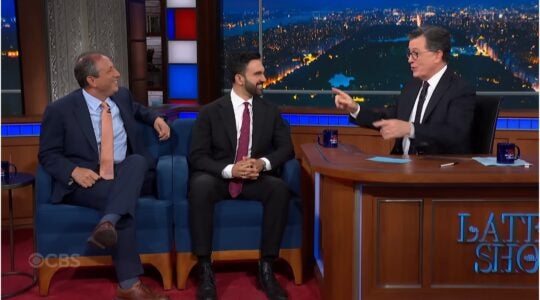Since the 2020 presidential election, Katherine Pawlowski, a 30-year-old living in Washington Heights, no longer self identifies as “Orthodox.”
“It blows my mind that so many highly educated people chose to vote in such an evangelical way,” said Pawlowski, referring to the widespread, although not unanimous, support Donald Trump received from New York’s Orthodox Jewish community.
Pawlowski, who once identified as “strongly Orthodox leaning charedi,” now eschews the label for fear it will link her with a “political ideology that I don’t want to be associated with.”
She is not alone, although how widespread her feelings are is not clear. Some polls put support for Trump at 80 percent or so among self-identifying Orthodox Jews, who praised Trump’s pro-Israel policies and support for a socially conservative religious agenda. Protests in Orthodox neighborhoods of Brooklyn and elsewhere over Covid-19 restrictions sometimes turned into pro-Trump rallies. Orthodox Biden supporters claimed they felt ostracized in their synagogues and communities.
“I feel a real knee-jerk revulsion at some of the conspiracy theories and supremacist ideas being espoused by friends of mine who go back years,” said Amichai Levy, a 32-year-old computer programmer from New Rochelle who considers himself Modern Orthodox. In recent weeks, he has become increasingly vocal against the strain of “Trumpism” he sees sweeping the Orthodox community.
“My first response is that I can’t be anywhere near this,” he said, describing how he feels when he sees fellow Orthodox Jews praising Trump online or even, in recent days, perpetuating unfounded theories of widespread voter fraud and electoral foul-play.
“I’ve made an effort to overcome that initial response so I can be with people where they are,” said Levy, whose father is the rabbi of a large Orthodox synagogue on Long Island where support for Trump is “overwhelming.”
“From a moral perspective, I think its important to interact positively and cordially with people I strongly disagree with,” he said.
Still, the process of separating between fellow community members and an ideology he finds erosive is painstaking work at best.
“It’s definitely been a moment of soul-searching,” said Levy, who feels grateful that in his own Modern Orthodox synagogue in New Rochelle, he is by-and-large surrounded by likeminded individuals.
‘It’s Hard to Feel Proud’
The unprecedented polarization by place, race and and even family lines over the course of the election is not unique to the Orthodox Jewish community. Among other ethnic groups that went heavily for Biden, including the Latino and Black communities, a strong showing for Trump among a vocal minority drove wedges within close-knit communities, often along generational lines. (The most recent podcast episode of “This American Life” reported on intergenerational political divides within Florida’s Cuban Latino community.)
For those who view themselves as “Modern Orthodox,” the stakes feel particularly high.
“It’s hard to feel proud about being an Orthodox Jew when these are not my people at all,” said Yitz Finkelstein, a 47-year-old accountant from Fair Lawn, N.J. referring to the Orthodox community’s vocal and public display of support for Trump. Today, he identifies as Modern Orthodox through he was raised in a more charedi community in Brooklyn. His aberrant political positions have left him on the outskirts of his extended family. In one anecdote, he shared how his opinions of Trump “nearly blew up my family WhatsApp group.”
When a religious community becomes committed to a problematic personality for practical gains, it risks losing its fundamental character.
“We decided to extinguish politics from the channel, so we can try and remain a family,” he said. Still, on social media he continues to have heated exchanges with immediate family members.
“Trump has sharpened the lines. It didn’t feel this way before. Supporting George W. Bush didn’t make you ‘immoral.’ But this is different,” he said, citing Trump’s treatment of immigrants and hesitancy to decry his white supremacist followers. “When you grow up in such a way where you’re told this is the good and the righteous and the moral and then those same voices say they proudly stand behind someone who is so blatantly immoral — it’s very troubling,” he said.
In an essay this week, Rabbi Yosef Blau, the senior mashgiach ruchani or spiritual adviser at Yeshiva University, made a similar point, warning that when “a religious community becomes committed to a problematic personality for practical gains, it risks losing its fundamental character.”
Finkelstein says he takes solace in the activist group Torah Trumps Hate, an online community of primarily Orthodox Jews who are vocally critical of Trump. “I have them to thank for my sanity.”
The identity-crisis spurred by the Orthodox Jewish community’s vocal support of Trump extends even to those who previously parted ways with the Orthodox community for other reasons.
“The Orthodox Jewish community completely lost my respect during Trump’s presidency and significantly damaged my connection with Judaism in the process,” wrote Eitan Levine, a comedian who grew up in the Orthodox community, though he no longer identifies as such. The Nov. 4 Facebook post was widely shared and garnered upwards of 150 comments. Levine signed the post as “An Emotionally Confused Jew.”
“I’m not going to pretend that’s why I don’t really consider myself Orthodox anymore, but it’s a big part,” one comment reads. “Leaving really is an effective way of dealing with this, though it’s perhaps not for everyone,” another comment reads.
“I can’t say I saw this coming,” said Pawlowski, who became a Jew by choice shortly before Trump’s arrival in the Oval Office.
“Watching the community align so closely with Trump has left me feeling pretty blindsided,” she said. “I don’t think there’s a way to go back at this point.”
The New York Jewish Week brings you the stories behind the headlines, keeping you connected to Jewish life in New York. Help sustain the reporting you trust by donating today.




